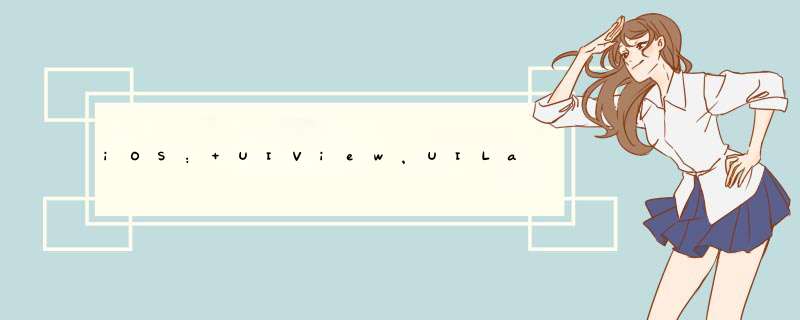
label.layer.cornerRadius = 2
label.layer.masksToBounds = YES / label.layer.clipToBounds = YES
这样会出现离屏渲染,如果是每个TableViewCell设置一些圆角,就会使列表滑动起来有明显卡顿。
正确方式:
摒弃label.layer.masksToBounds = YES / label.layer.clipToBounds = YES方法。
情形1:
对于不需要设置背景色的情况,只设置borderWidth、borderColor,cornerRadius,就可以实现圆角功能。
情形2:
对于设置背景色的情况,不去设置label的backgroundColor,而是直接设置label.layer.backgroundColor,这样就可以实现单独设置cornerRadius,显示圆角的效果。
备注:
对于情形2,设置label的backgroundColor同时设置cornerRadius是不能正常显示圆角的,再同时设置borderWidth、borderColor也不行。原因是:UILabel设置backgroundColor的行为,不再是设定layer的背景色而是为contents设置背景色。
先看以下的效果图- (void)tableView:(UITableView*)tableViewwillDisplayCell:(UITableViewCell*)cellforRowAtIndexPath:(NSIndexPath*)indexPath {
// 圆角角度
CGFloatradius =10.f
// 设置cell 背景色为透明
cell.backgroundColor = UIColor.clearColor
// 创建两个layer
CAShapeLayer*normalLayer = [[CAShapeLayeralloc]init]
CAShapeLayer*selectLayer = [[CAShapeLayeralloc]init]
// 获取显示区域大小
CGRectbounds =CGRectInset(cell.bounds,10,0)
// 获取每组行数
NSIntegerrowNum = [tableViewnumberOfRowsInSection:indexPath.section]
// 贝塞尔曲线
UIBezierPath*bezierPath =nil
//考虑一行和多行的情况,若行数为1,则这个cell的每个角都是圆角,否则第一行的左上和右上为圆角,最后一行的左下和右下为圆角
if(rowNum ==1) {
// 一组只有一行(四个角全部为圆角)
bezierPath = [UIBezierPathbezierPathWithRoundedRect:bounds
byRoundingCorners:UIRectCornerAllCorners
cornerRadii:CGSizeMake(radius, radius)]
}else{
if(indexPath.row==0) {
// 每组第一行(添加左上和右上的圆角)
bezierPath = [UIBezierPathbezierPathWithRoundedRect:bounds
byRoundingCorners:(UIRectCornerTopLeft|UIRectCornerTopRight)
cornerRadii:CGSizeMake(radius, radius)]
}else if(indexPath.row== rowNum -1) {
// 每组最后一行(添加左下和右下的圆角)
bezierPath = [UIBezierPathbezierPathWithRoundedRect:bounds
byRoundingCorners:(UIRectCornerBottomLeft|UIRectCornerBottomRight)
cornerRadii:CGSizeMake(radius, radius)]
}else{
// 每组不是首位的行不设置圆角
bezierPath = [UIBezierPathbezierPathWithRect:bounds]
}
}
//将贝塞尔曲线的路径赋值给图层,并将图层添加到view
// 把已经绘制好的贝塞尔曲线路径赋值给图层,然后图层根据path进行图像渲染render
normalLayer.path= bezierPath.CGPath
selectLayer.path= bezierPath.CGPath
UIView*nomarBgView = [[UIViewalloc]initWithFrame:bounds]
// 设置填充颜色
normalLayer.fillColor = [UIColor colorWithWhite:0.95 alpha:1.0].CGColor
// 添加图层到nomarBgView中
[nomarBgView.layerinsertSublayer:normalLayeratIndex:0]
nomarBgView.backgroundColor = UIColor.clearColor
cell.backgroundView= nomarBgView
//圆角显示就完成了,但是如果没有取消cell的点击效果,会出现一个灰色的长方形的形状,再用上面创建的selectLayer给cell添加一个selectedBackgroundView
UIView*selectBgView = [[UIViewalloc]initWithFrame:bounds]
selectLayer.fillColor = [UIColor colorWithWhite:0.95 alpha:1.0].CGColor
[selectBgView.layerinsertSublayer:selectLayeratIndex:0]
selectBgView.backgroundColor = UIColor.clearColor
cell.selectedBackgroundView= selectBgView
}
func tableView(_tableView:UITableView, willDisplay cell:UITableViewCell, forRowAt indexPath:IndexPath) {
// 圆角角度
let radius =calculate(w:35.0)
// 设置cell 背景色为透明
cell.backgroundColor = UIColor.clear
// 创建两个layer
let normalLayer =CAShapeLayer()
let selectLayer =CAShapeLayer()
// 获取显示区域大小
let bounds = cell.bounds.insetBy(dx:10.0, dy:0)
// 获取每组行数
let rowNum = tableView.numberOfRows(inSection: indexPath.section)
// 贝塞尔曲线
var bezierPath:UIBezierPath
if(rowNum==1) {
// 一组只有一行(四个角全部为圆角)
bezierPath =UIBezierPath(roundedRect: bounds, byRoundingCorners: .allCorners, cornerRadii:CGSize(width: radius, height: radius))
}else{
if(indexPath.row==0) {
// 每组第一行(添加左上和右上的圆角)
bezierPath =UIBezierPath(roundedRect: bounds, byRoundingCorners: [UIRectCorner.topLeft,UIRectCorner.topRight], cornerRadii:CGSize(width: radius, height: radius))
}elseif(indexPath.row==rowNum-1) {
// 每组最后一行(添加左下和右下的圆角)
bezierPath =UIBezierPath(roundedRect: bounds, byRoundingCorners: [UIRectCorner.bottomLeft,UIRectCorner.bottomRight], cornerRadii:CGSize(width: radius, height: radius))
}else{
// 每组不是首位的行不设置圆角
bezierPath =UIBezierPath(rect: bounds)
}
}
// 把已经绘制好的贝塞尔曲线路径赋值给图层,然后图层根据path进行图像渲染render
normalLayer.path= bezierPath.cgPath
selectLayer.path= bezierPath.cgPath
let nomarBgView =UIView(frame: bounds)
// 设置填充颜色
normalLayer.fillColor=UIColor.white.cgColor
// 添加图层到nomarBgView中
nomarBgView.layer.insertSublayer(normalLayer, at:0)
nomarBgView.backgroundColor=UIColor.clear
cell.backgroundView= nomarBgView
let selectBgView =UIView(frame: bounds)
selectLayer.fillColor= UIColor.white.cgColor
selectBgView.layer.insertSublayer(selectLayer, at:0)
selectBgView.backgroundColor=UIColor.clear
cell.selectedBackgroundView= selectBgView
}
先添加QuartzCore.framework这个库,还有在你的文件中包含#import 。在实际的应用中,我们总感觉圆角的东西比较好看, 像button,label,image等等,以前的时候我就经常给那些控件添加一个UIImageView作为背景,再搞张圆角的图片
viewT.layer.cornerRadius = 10//设置那个圆角的有多圆
viewT.layer.borderWidth = 10//设置边框的宽度,当然可以不要
viewT.layer.borderColor = [[UIColor redColor] CGColor]//设置边框的颜色
viewT.layer.masksToBounds = YES//设为NO去试试。设置YES是保证添加的图片覆盖视图的效果
UIImageView *v=[[UIImageView alloc] initWithFrame:CGRectMake(25, 25, 100, 100)]v.image=[UIImage imageNamed:@"face01.png"][[v layer] setBorderWidth:2.0]//画线的宽度 [[v layer] setBorderColor:[UIColor blackColor].CGColor]//颜色 [[v layer]setCornerRadius:15.0]//圆角 v.backgroundColor=[UIColor redColor]//[v.layer setCornerRadius:8.0][v.layer setMasksToBounds:YES][self.view addSubview:v][v release]
欢迎分享,转载请注明来源:内存溢出

 微信扫一扫
微信扫一扫
 支付宝扫一扫
支付宝扫一扫
评论列表(0条)